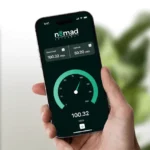Nomad Internet vs Spectrum Internet: Which ISP Giant is More Suitable for Your Needs
Imagine the internet as your vehicle on the information superhighway. You have two options: a sleek, elegant sports car that can go anywhere without limits or a sturdy sedan that drives well but requires specific roads and stops at every red light. Nomad Internet is the sports car of ISPs, designed for the adventurous and mobile lifestyle, while Spectrum is a reliable sedan built for stability but bound by infrastructure. Here’s why choosing Nomad Internet is like opting for the ultimate freedom machine.

Content
Nomad Internet:
Nomad Internet offers a liberating experience, particularly for digital nomads, adventurers, and those living in rural settings. It overcomes the limitations of conventional cable connections by offering wireless internet access across the country. Imagine having the flexibility to work from your comfortable RV, a lodge in the mountains, or a secluded beach while having fast internet.
The options offered by Nomad Internet are as versatile as your trip schedule. They don’t force you into a long-term contract and offer a range of data plans catering to your requirements. This implies that you can change course and tailor your service as your journey develops.
Spectrum Internet:
A seasoned competitor in the ISP market, Spectrum Internet provides cable-based internet services and packaged packages, including TV and phone services. Many urban and suburban households are familiar with this option since it offers reliable and constant internet access.
Spectrum’s service is ideal for those who prioritize stability and are firmly rooted in one location. Spectrum caters to traditional internet users seeking a comprehensive package with various plans and bundled services.
Nomad Internet vs Spectrum Internet: A Direct Comparision
1. Mobility and Flexibility: The Freedom to Roam
Nomad Internet is designed for life on the move. With this all-purpose ISP, you can keep a dependable connection anywhere there is a cellular signal. Contrarily, Spectrum is constrained by infrastructure, which keeps you confined to one place and restricts your freedom of movement.
2. No Strings Attached: Break Free from Contracts
Nomad Internet offers the freedom of a no-contract service. Although Spectrum frequently needs a contract, with early termination fees as hurdles for customers wanting to alter their plans, you can switch, upgrade, or cancel your plan anytime without penalty—just like a reliable rucksack ready for any expedition.
3. Unlimited Adventure: Data Without Limits
With Nomad Internet, you can stream, download, and explore without worrying about exceeding data limits because it offers limitless data without throttling. The plans offered by Spectrum can have implicit restrictions or speed drops following a certain amount of use, which could seriously hinder your internet experience.
4. Off the Beaten Path: Reach the Unreachable
Nomad Internet is your key to connectivity if you live or work in a remote or rural location. It serves as a lifeline for residents of underdeveloped areas by operating in places where cable services like Spectrum might not be available. For those in isolated locations, Nomad offers the ability to stay connected when it matters most.
5. Easy Setup: Hit the Road Without a Pit Stop
Setting up Nomad Internet is as simple as plug-and-play. There’s no need for complicated installations or professional setup—plugin, and you’re ready to go. On the other hand, Spectrum may require a professional installation, which can delay your journey and add unnecessary costs.
Spectrum Internet: The Cons of Conventional Connectivity
1. Stuck in One Place: Limited Mobility
The fixed location that comes with Spectrum’s cable-based service makes it less enticing to people who prefer to travel or lead nomadic lifestyles. Spectrum’s service restrictions may feel like a parking brake on your independence if your heart aches for the open road.
2. Contractual Chains: The Cost of Commitment
The necessity for contracts with Spectrum can be restrictive. The penalties associated with early termination fees make it less appealing to customers who appreciate flexibility and adaptation if you need to change your service.
3. Data Caps and Throttling: The Speed Bumps of Streaming
Despite offering unlimited data, some Spectrum plans may throttle speeds after a specific usage threshold, creating speed bumps in your digital experience. This can be frustrating for heavy users who need consistent performance for work or leisure.
4. Limited Reach: The Urban Limitation
Spectrum’s reach is primarily concentrated in urban and suburban areas, leaving rural regions underserved. This restricts its appeal to those in remote locations who need reliable internet access for work, education, or staying connected with loved ones.
5. Installation Hassles: The Delay of Deployment
Spectrum often requires professional installation, leading to delays and additional costs. For those who prefer immediate connectivity, this drawback can hinder your ability to get online quickly.
Conclusion: Embrace the Nomadic Spirit
It’s essential to match your lifestyle and connectivity requirements when selecting an ISP. Nomad Internet is the obvious option for people who appreciate flexibility, independence, and boundless exploration. For digital nomads, rural residents, and anyone who prefers to have an adventurous attitude over being rooted in one area, it’s the perfect internet companion.
While Spectrum provides a stable and comprehensive service for traditional households, it cannot match the agility and autonomy offered by Nomad Internet. If your journey requires more than just a reliable connection—if it calls for the freedom to connect from anywhere—Nomad Internet is your ideal choice.
Hit the open road with Nomad Internet and never look back. Stay connected wherever your adventures take you, and enjoy the ride with the internet service provider that matches your lifestyle and spirit of exploration.












